We’re having trouble getting the Internet hooked up in my new apartment, so it seems like exactly the right time for this particular Narrative Nonfiction 5 list. Read on to find out why!
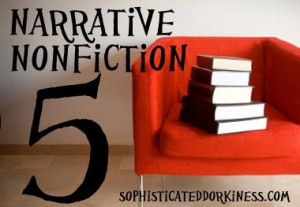 This is a little bit of a nontraditional Narrative Nonfiction 5 list, since I think it’s a bit of a stretch to call most of these books “narrative nonfiction.” They’re more classic nonfiction, even though the bits I’ve read of each do have a conversational style that I really appreciate.
This is a little bit of a nontraditional Narrative Nonfiction 5 list, since I think it’s a bit of a stretch to call most of these books “narrative nonfiction.” They’re more classic nonfiction, even though the bits I’ve read of each do have a conversational style that I really appreciate.
The books on this list are all responses to the fact that technology is changing us as individuals and a society – some think for the better, and some think for the worse. Ever since I started my new job (working for a engineering trade magazine), it seems I can’t get enough of this discussion, and wanted to share some of the books I’m most excited about reading with you.
The Shallows by Nicholas Carr
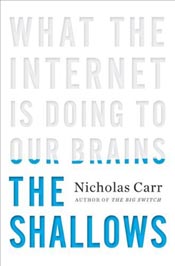 The Shallows: What the Internet is Doing to Our Brains
The Shallows: What the Internet is Doing to Our Brains
I started reading this book on my nook last week, and so far am quite enjoying it. Carr argues that the way the Internet works – connected links and constant movement from one thought to another – is fundamentally reshaping our brains, and not necessarily for the better.
So far, I think the book has done a nice job of being conversational not confrontational, and isn’t the sort of Luddite argument against technology that it could be. I’m looking forward to seeing where it goes.
Cognitive Surplus by Clay Shirky
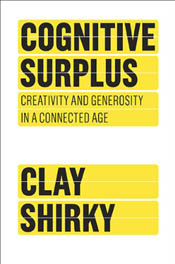 Cognitive Surplus: Creativity and Generosity in a Connected Age
Cognitive Surplus: Creativity and Generosity in a Connected Age
In this book, scholar Clay Shirky looks at the way changing technology has shifted us from passive consumers to active participants in our media. The idea of “cognitive surplus” is all the extra brainpower Shirky thinks we can use to make a difference.
I want to read this book as a sort of contrast to The Shallows because I think it’s less down on technology. I’m also interested in the possibilities new technology has for community engagement and helping the world, which this book addresses.
Hamlet’s BlackBerry by William Powers
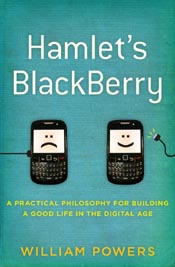 Hamlet’s BlackBerry: A Practical Philosophy for Building a Good Life in the Digital Age
Hamlet’s BlackBerry: A Practical Philosophy for Building a Good Life in the Digital Age
I came across this book in one of Harper e-mails offering review copies, and I had to ask for it. In it, Powers uses literature and history to argue that being connected is best when we are balance it with ways to disconnect.
This is another book that I think I’m drawn to because of work. I spent eight hours a day at a computer consuming and producing information for our website, then come home and want to blog and tweet and be on Facebook in a way that’s sucking my time. I’ve become a sucker for any books about work/life balance in the digital age.
Your Brain at Work by David Rock
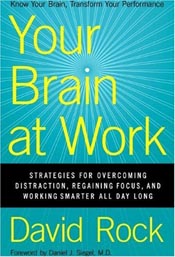 Your Brain at Work: Strategies for Overcoming Distraction, Regaining Focus, and Working All Day Long
Your Brain at Work: Strategies for Overcoming Distraction, Regaining Focus, and Working All Day Long
Your Brain at Work is the most nonfiction of these books, in the sense that it reads a little like a self-help manual. Rock uses two fictional characters – Paul and Emily – to go through the distractions and problems of a single day, staring with the morning e-mail overwhelm and ending a call for some cultural transformation.
I want to read this book because I feel like I’ve become really distracted during my work day. I find myself flipping almost manically between e-mails and writing and watching videos for most of the day. I’m plenty productive, it just feels really insane. I want to work on this, and I’m hopeful the book will have some good tips.
Better Off by Eric Brende
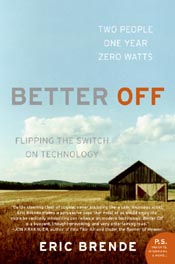 Better Off: Flipping the Switch on Technology
Better Off: Flipping the Switch on Technology
And finally, the most narrative of the five books on this list. In this memoir, MIT graduate Eric Brende and his wife, Mary, ditched all of their technology – car, electric stove, refrigerator, and everything else on the grid – to join a remote community. The book is the story of their experiment living off the grid.
Another thing I’ve always loved are books about people who decide to make a drastic change in their lives, and this book is a prime example of this one. I’ve skimmed a couple chapters, and so far I’ve liked the mix of science and story in this book.
Have any favorite nonfiction (narrative or not) about technology or the Internet? Any big books I’ve missed? I’ve read a little bit in all of these books – thoughts on which one I should commit to first?

Comments on this entry are closed.
Better Off sounds really interesting! I’ve heard of the Carr book but haven’t wanted to read it because, er, I luurv the internet. :p And I don’t want to feel I’m incapable of sustaining focus and it’s the internet’s fault. *is ostrich*
(I used the internet a few years ago to discover that ostriches don’t really stick their heads in the sand.)
Jenny: I love the Internet too, which is one of the things about Carr’s book that I’m sort of worried about — I’d hate to tarnish my affection for the Interwebs. But… I also sometimes feel like I cannot focus, and I’m curious if this is why. Luckily, in the first part of the book he talks about reading long books, and since I can clearly do that, I must not be as incapable of sustained thought as I sort of think I am.
The only technology related nonfiction I’ve read recently is What Video Games Can Teach Us About Learning and Literacy. If you are at all interested in the theory behind learning (and teaching) it’s a fascinating read. I don’t think you have to be much a video game fan to enjoy it, but it’s hard to say since I am!
Scott: My roommate Amanda is starting a games and learning grad program, and I suspect she’s read that book. I’ll have to raid her bookshelf to find it because it does sound really interesting.
I enjoyed Better Off (with a different cover) a year or so ago. I’ve wondered what happened to Brende and his family now that they have returned to more “normal” life.
I can recommend Flickering Pixels (How Technology Shapes Your Faith) by Shane Hipps. I disagreed with his position, but still a good read for discussion.
Causewired (Plugging in, Getting Involved, Changing the World) by Tom Watson looks at how social media, technology and the Net are impacting social and political causes. Fascinating!
Monica: The paperback I read did have a little update thing at the end, talking about the Brende family living in St. Louis. sounds like they’re still doing good trying to be minimalists.
Causewired is going on my TBR list – it sounds awesome.
Aww, since I’m a St. Louisan I’m going to have to check out Better Off! Plus I love the whole minimalist idea and fantasize about living that way myself.
Lynne: As I was moving all my stuff, I was definitely fantasizing about having less of it 🙂 We’re still settling in and trying to merge two apartments, which makes me want to get rid of stuff even more!
I have The Shallows but have to return it to the library today and didn’t get to read even one page. Darn it.
Lynne: Check it out again! I’m really curious what other people will think of it, once I actually finish it myself.
I will. It IS fun to see what other people think about books you’ve read, isn’t it? For some reason I especially like when someone hates a book I loved or vice versa.
I need to read Your Brain at Work for fear that I will spend my life in The Shallows. lol Seriously though, I agree with the premise of The Shallows and don’t think that it is just the internet that has created the problem.
I just finished up Social Media Metrics by Jim Sterne. The style of writing was very easy going, but overall, I was suffering a bit from information overload. Was hoping for a book to learn how to measure my little acts of social media, not track it for a big brand.
Gwen: Lol! I don’t think it’s just the Internet either, but I do think it’s an interesting argument that the way the Internet is designed to work would change the way we think. I had to return Your Brain at Work without reading much at all, but I’m planning to check it out again.
Social Media Metrics sounds interesting, but there are a lot of social media books coming out now that could be good or not, depending on what you’re reading them for.
Hamlet’s Blackberry is sitting on my nightstand under my Blackberry, iPod Touch, and right next to my Nook. What does this say about me? Hmmphf.
Andi: Lol, that you have a lot of things going on, but recognize the problem? If I had a BlackBerry, I’d put it next to the book all the time, just because I’d find it amusing.
Hamlet’s Blackberry looks good to me – I find it harder and harder to “turn off” these days even though I feel my mind buzzing with information overload.
Colleen: I’ve been finding it pretty hard to turn off too — there always seems to be something that needs doing. I have to admit, not being hooked to the Internet for a few days right after the move was kind of nice; I got a lot of reading done when I wasn’t wasting time on Facebook!